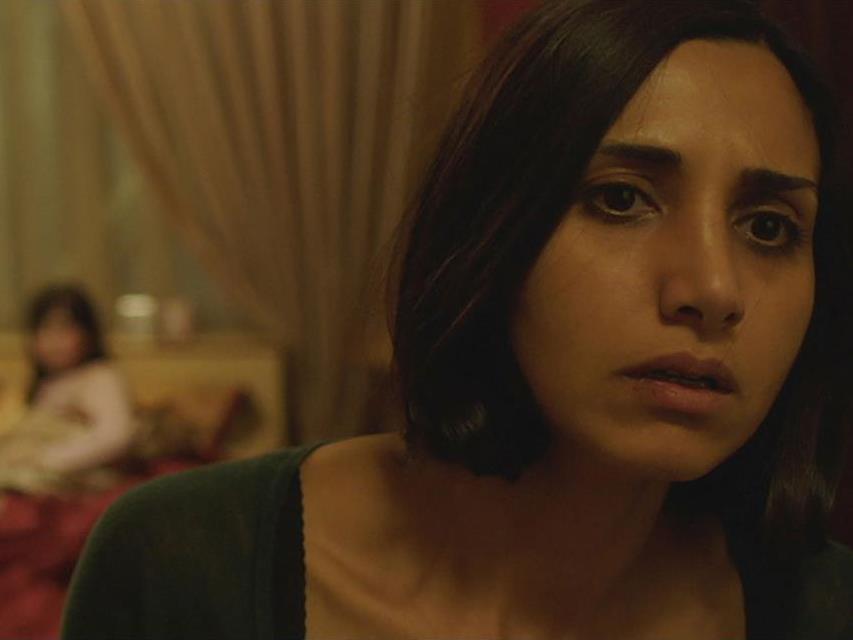Image: Narges Rashidi in Under The Shadow photograph courtesy of Sydney Film Festival.
Tehran is a tentative, threatening and terse place when chilling thriller Under the Shadow begins. The year is 1988, and the Iran-Iraq war has spanned the entire decade to date, dictating the lives and choices of the city’s residents. For Shideh (Narges Rashidi, German TV’s Die Spezialisten – Im Namen der Opfer), the continued conflict proves a destabilising force even when air raid sirens aren’t sounding and apartment walls aren’t shaking, as she tries to navigate the barriers built by a nation firmly in battle mode. After initially postponing her university studies when combat broke out, and then opting to stay home to raise her daughter Dorsa (debutant Avin Manshadi) while her husband Iraj (Bobby Naderi, Argo) became a doctor, her activist past during the revolution now thwarts her own medical aspirations.
Indeed, political unrest and the oppressive danger it can cause loom large over Babak Anvari’s debut feature, a film that lets several clouds hover over its struggling protagonist. And yet, as effectively as the writer/director ties Under the Shadow‘s climate of terror and restraint to the time-specific troubles of its setting, his movie isn’t simply a dissection of a country blighted by conflict. When an undetonated missile lodges in the family’s apartment building after Iraj is despatched to the front lines, and then Dorsa starts dreading a supernatural presence — exacerbated by a superstitious neighbour (Aram Ghasemy, The Pear Tree) who believes in ghostly entities called djinn, as well as her scared-mute nephew — it channels its societal tensions into a haunted house horror movie.
Using frightening forces of the spiritual kind to comment upon tangible real-world troubles may not be a new approach, but in the right hands, it can be equally rousing and resonant on a thematic and aesthetic level. Anvari demonstrates his deft touch with both, never shying away from the former and employing an ominous atmosphere, unnerving sound design, jolting pacing, and playful framing — whether roaming through beige hallways, suddenly turning the image on its side, planting something sinister in the distance, or gradually inching over to reveal to previously unseen sights — to cultivate the latter.
Accordingly, as an exercise in genre that simultaneously reflects, heightens, and explores the fears of a specific reality, Under the Shadow swiftly demonstrates skill to match its style, and just as quickly unsettles its audience by embracing and subverting horror tropes in tandem. Certain developments and flourishes may be easily anticipated; however, here, a missing doll, an absent VHS tape of Jane Fonda workout sessions, broken windows, and eerie noises work just as well on narrative and symbolic levels. In fact, amidst the feature’s many contemplative layers exists a further manifestation of its titular situation, and perhaps its strongest component: an examination of the primal state that is being a mother. As Dorsa falls prey to the lure of a haunting surrogate guardian, Shideh is caught between the nurturing and protective impulses that remain engrained in parenthood.
With such weighty contemplations — including the restrictions upon femininity inherent to both Iran at the time and in assuming the role of the primary care-giver in general — nestled within astutely deployed bumps and jumps, it is subsequently hardly surprising that much of the burden for the film’s emotional impact resides in its performances. Manshadi convincingly cycles through the many reactions expected of a simultaneously scared and enticed child, but it is Rashidi’s shoulders that the bulk of Under the Shadow rests upon. The devolution of her character from resolute in her decision to remain in Tehran and impatient with her daughter’s pleadings, to determined to do whatever it takes to leave and wilfully dismissive of conservative trappings, compellingly blends the classic genre heroine archetype with an urgent, empathetic statement. Spanning patriarchal control, domestic duties, the imposition of veils, and the menacing spirit that won’t leave her home alone, her protagonist might be trapped by many forces; however it is Rashidi’s own sometimes abrupt, sometimes fragile, always defiant presence that casts the movie’s strongest shadow.
Rating: 4 stars out of 5
Director: Babak Anvari
Iran | Jordan | Qatar | UK, 2016, 84 mins
Distributor: Rialto
Festival rating: 18+
General release date: TBC
Sydney Film Festival
June 8 – 19 2016
Actors:
Director:
Format:
Country:
Release:





